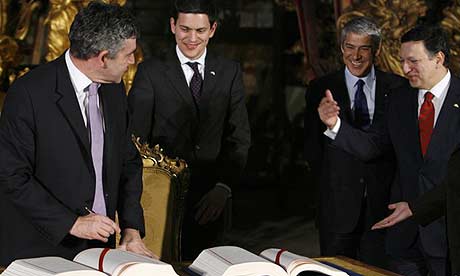Results 1 to 2 of 2
Thread Information
Users Browsing this Thread
There are currently 1 users browsing this thread. (0 members and 1 guests)
Threaded View
-
06-25-2008, 03:53 PM #1Senior Member


- Join Date
- May 2007
- Location
- South West Florida (Behind friendly lines but still in Occupied Territory)
- Posts
- 117,696
Legal bid to force EU referendum fails
Legal bid to force EU referendum fails
Andrew Sparrow, Jenny Percival and agencies guardian.co.uk, Wednesday June 25, 2008

Gordon Brown signing the Lisbon treaty last year. Photograph: Paulo Duarte/AP
The Conservative Eurosceptic millionaire Stuart Wheeler today lost his high court bid to force the government to hold a referendum on the EU's Lisbon treaty.
Two judges said that his application for a judicial review of the government's decision to ratify the treaty without holding a referendum "lacks substantive merit and should be dismissed".
Wheeler argued that the public had a "legitimate expectation" that there would be a referendum because Labour had promised a referendum on the EU constitution in its 2005 election manifesto and because the Lisbon treaty was very similar to the constitution.
But, in their ruling, the judges said that the constitution and the Lisbon treaty were not the same.
And, crucially, they said that, even if ministers had promised a referendum on the Lisbon treaty, that would be a political promise to be enforced by parliament, not the courts.
The government welcomed the decision. Parliament has passed an act allowing the government to ratify the treaty, and the formal process of ratification is due to go ahead soon.
Britain is determined to press ahead with ratification, even though the Irish vote against the treaty has cast doubt on whether it will be implemented because its provisions need to be agreed on by all 27 EU states.
The prime minister's spokesman said that the government hoped to be able to proceed with the final stages of ratification "within the next few days or weeks".
He added: "It does depend on the availability of the Great Wafer Seal, among other things. There are various administrative procedures that need to be undertaken. It is normally a Foreign Office official who is tasked with taking these things to Rome."
The Wafer Seal is a smaller copy of the obverse side of the Great Seal of the Realm, bearing an image of the Queen, which is embossed on certain official documents.
The judges refused permission to appeal, which Wheeler's lawyers had sought on the grounds of the "serious legal, constitutional and public interest issues arising in the case".
Lord Justice Richards said: "We are satisfied that an appeal has no prospect of success.
"Whilst the issues raised are interesting and important, that is outweighed by the desirability of certainty and the avoidance of unnecessary delay in this matter.
"There is no other compelling reason why an appeal should be heard."
But, outside the court, Wheeler said he would apply to the court of appeal for permission to challenge the ruling.
Jim Murphy, the Europe minister, said: "I am pleased that the judges have come down very clearly on the side of the government and found that this claim 'lacks substantive merit and should be dismissed'.
"The judges have confirmed the government's position that the Lisbon treaty differs in both form and substance from the defunct constitution.
"The judges have also made a number of important points about the boundaries between parliament, government and the courts.
"With parliament's approval, the government is proceeding to ratify the Lisbon treaty, which is in our national interest and is a good treaty for the UK."
Last week Gordon Brown said the government would not formally ratify the treaty until the high court had delivered its judgment.
Today Wheeler said the government was "morally obliged" to delay ratification until he had exhausted the appeal process.
But Foreign Office sources said that ratification, which is due to take place within the next month, would go ahead anyway.
An official said: "This is a categorical ruling and Wheeler's case has been comprehensively quashed. He has not been given leave to appeal. Now the government has to have the right to govern."
But he said that if, at any point in the future a court were to order the government to delay ratification, the government would obey.
http://www.guardian.co.uk/world/2008/ju ... eignpolicyJoin our efforts to Secure America's Borders and End Illegal Immigration by Joining ALIPAC's E-Mail Alerts network (CLICK HERE)


 LinkBack URL
LinkBack URL About LinkBacks
About LinkBacks






 Reply With Quote
Reply With Quote

Migrants Breach Fortified Border Barrier, March Through Texas...
05-16-2024, 08:20 PM in illegal immigration News Stories & Reports